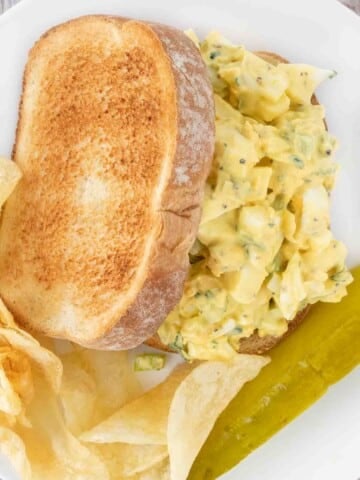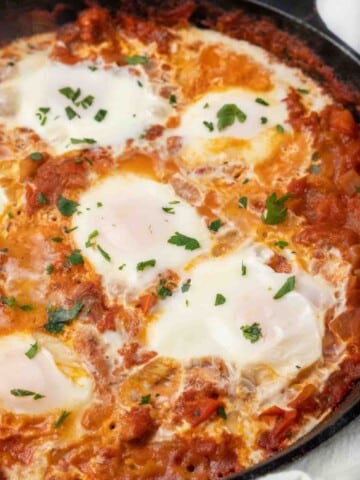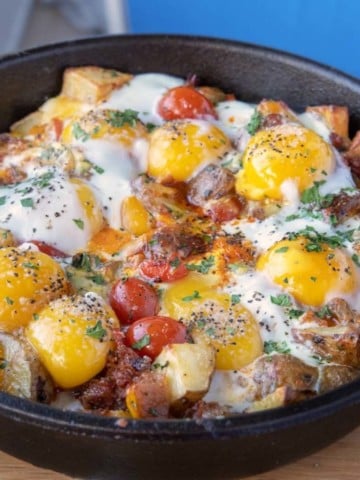It’s easy to make the perfect hard-boiled eggs with creamy yolks and tender whites once you learn that the best hard-boiled eggs are really hard-cooked eggs.

Large hard-boiled eggs contain 6 grams of protein, making them the perfect snack for in-between meals, after workouts, or as an addition to a salad.

I’ve been a fan of hard-boiled eggs for as long as I can remember, and I enjoy using them to make our homestyle egg salad and, my absolute favorite, deviled eggs.
If you enjoyed this recipe, make sure to try our smoked hard-cooked eggs recipe. The smoking process adds another layer of flavor to these little beauties.
Ingredients to make Hard-Boiled Eggs

Gathering the ingredients to make this recipe doesn’t take much time, as the only thing you need to make our hard-boiled eggs recipe is large eggs.
What type of eggs should I use?
You can use any brand of eggs that are available at your local grocer. My personal favorite is pasture-raised eggs; they have a vibrant egg yolk ranging from a deep yellow to an almost orange color. Believe it or not, that’s how all eggs used to look before we began mass-producing them.
But here’s where the freshest is not always the best. Fresh eggs are harder to peel than eggs that might be a few weeks old. Of course, you can use fresh eggs, but if you have some that have been sitting in your refrigerator for a while, those are the ones you want to use.
So, for best results, use older eggs rather than farm-fresh eggs.
How to Make Perfect Hard-Boiled Eggs
Let the eggs come to room temperature before cooking.

- Place the eggs in a single layer in a medium saucepan and cover them with cold water. Fill the pan so there is an inch of water covering the eggs.
- Place the pan on the stovetop over high heat and bring the water to a boil. *Do not use a lid.
- When the water comes to a roiling boil, reduce the heat to medium-high and let them cook for 4-5 minutes.
- Turn off the heat and leave the eggs in the water for 20 minutes to finish the cooking process. This will yield the perfect egg.
- Using a slotted spoon, remove the eggs from the hot water and place them in a large bowl of ice water (ice bath) for ten minutes to stop the cooking process.
- Peel the eggs while in the water. If the water is too cold, add a little hot water until it’s comfortable to the touch.
*Peeling them in the water will make them easier to peel.
What is the difference between hard-cooked eggs and hard-boiled eggs?
The difference is in the cooking technique. Hard-boiled eggs are boiled the entire time, which can lead to rubbery eggs. If you’ve ever noticed a green ring on the outside of the yolk, it’s a chemical reaction caused by cooking eggs for too long or at too high a temperature.
Hard-cooked eggs are boiled for a shorter time and left to finish cooking in the hot water. This process keeps the eggs softer and the yolks creamier.

Why not cook up a dozen this week and introduce your family to the joy of hard-boiled eggs? All you really need is a little salt and black pepper to enjoy one of nature’s perfect snacks.
You can store the hard-boiled eggs unpeeled. Make sure to dry them off, then place them in a hard-sided, airtight container in the refrigerator for up to one week. You can also store them peeled for 5-7 days refrigerated in a sealed container.
Freezing them is not advisable.
Recipe FAQ’s
Cold eggs are more likely to crack from the shock of the boiling water. Using eggs at room temperature will also prevent the whites from becoming rubbery.
Use whatever eggs you have on hand or usually buy. Large eggs or extra-large eggs are my preferred size simply because that means I have less to peel.
More than likely, the eggs are too fresh. Crazy, huh? The albumen (whites) of fresh eggs have a relatively low pH level, making them acidic. When they’re cooked, the whites bond strongly to the inner shell’s membrane. As they age, the pH level rises, and the inner membrane is less likely to bond to the albumen, so the shell peels off much easier.









Leave a Comment